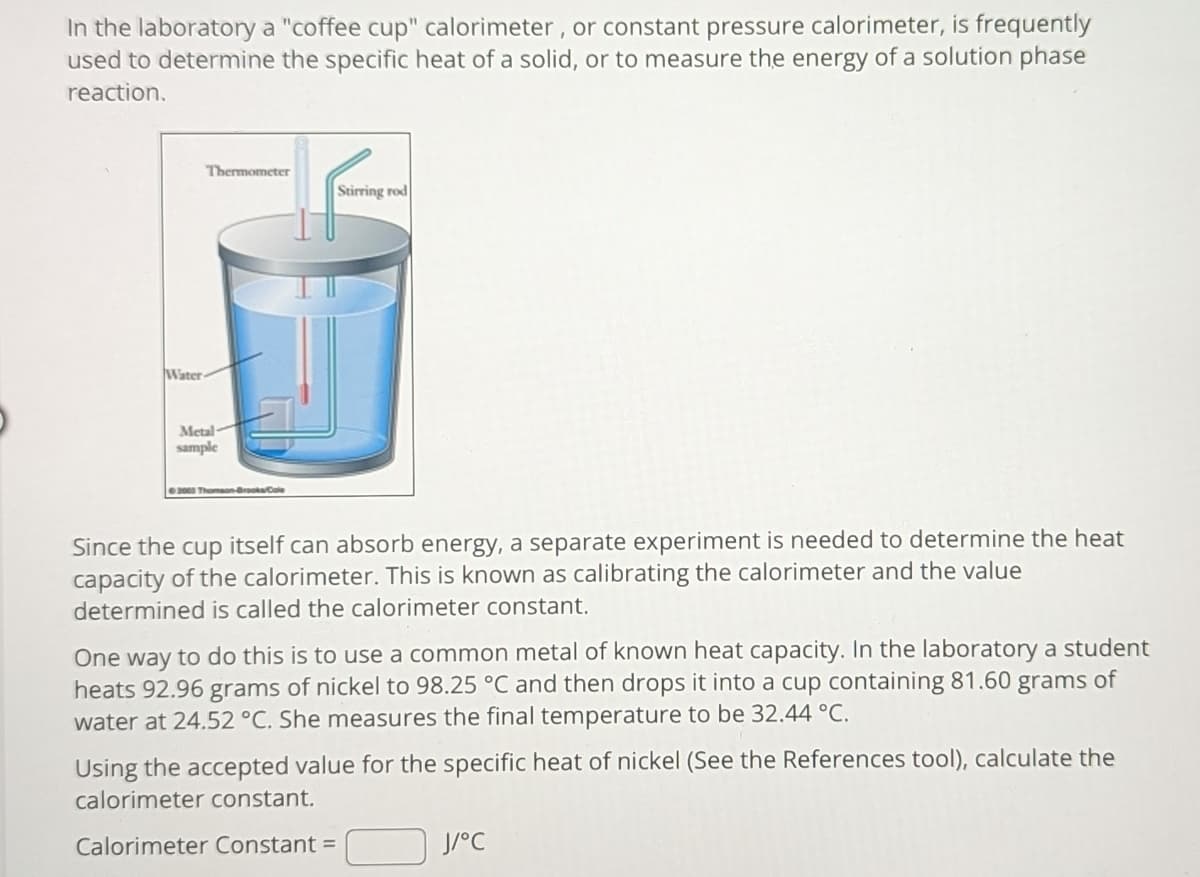In the laboratory a "coffee cup" calorimeter, or constant pressure calorimeter, is frequently used to determine the specific heat of a solid, or to measure the energy of a solution phase reaction. Water Thermometer Metal- sample 2000 Thomson-Brooks/Cole Stirring rod Since the cup itself can absorb energy, a separate experiment is needed to determine the heat capacity of the calorimeter. This is known as calibrating the calorimeter and the value determined is called the calorimeter constant. One way to do this is to use a common metal of known heat capacity. In the laboratory a student heats 92.96 grams of nickel to 98.25 °C and then drops it into a cup containing 81.60 grams of water at 24.52 °C. She measures the final temperature to be 32.44 °C. Using the accepted value for the specific heat of nickel (See the References tool), calculate the calorimeter constant. Calorimeter Constant = J/°C
In the laboratory a "coffee cup" calorimeter, or constant pressure calorimeter, is frequently used to determine the specific heat of a solid, or to measure the energy of a solution phase reaction. Water Thermometer Metal- sample 2000 Thomson-Brooks/Cole Stirring rod Since the cup itself can absorb energy, a separate experiment is needed to determine the heat capacity of the calorimeter. This is known as calibrating the calorimeter and the value determined is called the calorimeter constant. One way to do this is to use a common metal of known heat capacity. In the laboratory a student heats 92.96 grams of nickel to 98.25 °C and then drops it into a cup containing 81.60 grams of water at 24.52 °C. She measures the final temperature to be 32.44 °C. Using the accepted value for the specific heat of nickel (See the References tool), calculate the calorimeter constant. Calorimeter Constant = J/°C
Introduction to Chemical Engineering Thermodynamics
8th Edition
ISBN:9781259696527
Author:J.M. Smith Termodinamica en ingenieria quimica, Hendrick C Van Ness, Michael Abbott, Mark Swihart
Publisher:J.M. Smith Termodinamica en ingenieria quimica, Hendrick C Van Ness, Michael Abbott, Mark Swihart
Chapter1: Introduction
Section: Chapter Questions
Problem 1.1P
Related questions
Question

Transcribed Image Text:In the laboratory a "coffee cup" calorimeter, or constant pressure calorimeter, is frequently
used to determine the specific heat of a solid, or to measure the energy of a solution phase
reaction.
Thermometer
Water-
Metal-
sample
2000 Thomson-Brooks/Cole
Stirring rod
Since the cup itself can absorb energy, a separate experiment is needed to determine the heat
capacity of the calorimeter. This is known as calibrating the calorimeter and the value
determined is called the calorimeter constant.
One way to do this is to use a common metal of known heat capacity. In the laboratory a student
heats 92.96 grams of nickel to 98.25 °C and then drops it into a cup containing 81.60 grams of
water at 24.52 °C. She measures the final temperature to be 32.44 °C.
Using the accepted value for the specific heat of nickel (See the References tool), calculate the
calorimeter constant.
Calorimeter Constant =
J/°C
Expert Solution
This question has been solved!
Explore an expertly crafted, step-by-step solution for a thorough understanding of key concepts.
This is a popular solution!
Trending now
This is a popular solution!
Step by step
Solved in 3 steps

Recommended textbooks for you

Introduction to Chemical Engineering Thermodynami…
Chemical Engineering
ISBN:
9781259696527
Author:
J.M. Smith Termodinamica en ingenieria quimica, Hendrick C Van Ness, Michael Abbott, Mark Swihart
Publisher:
McGraw-Hill Education

Elementary Principles of Chemical Processes, Bind…
Chemical Engineering
ISBN:
9781118431221
Author:
Richard M. Felder, Ronald W. Rousseau, Lisa G. Bullard
Publisher:
WILEY

Elements of Chemical Reaction Engineering (5th Ed…
Chemical Engineering
ISBN:
9780133887518
Author:
H. Scott Fogler
Publisher:
Prentice Hall

Introduction to Chemical Engineering Thermodynami…
Chemical Engineering
ISBN:
9781259696527
Author:
J.M. Smith Termodinamica en ingenieria quimica, Hendrick C Van Ness, Michael Abbott, Mark Swihart
Publisher:
McGraw-Hill Education

Elementary Principles of Chemical Processes, Bind…
Chemical Engineering
ISBN:
9781118431221
Author:
Richard M. Felder, Ronald W. Rousseau, Lisa G. Bullard
Publisher:
WILEY

Elements of Chemical Reaction Engineering (5th Ed…
Chemical Engineering
ISBN:
9780133887518
Author:
H. Scott Fogler
Publisher:
Prentice Hall


Industrial Plastics: Theory and Applications
Chemical Engineering
ISBN:
9781285061238
Author:
Lokensgard, Erik
Publisher:
Delmar Cengage Learning

Unit Operations of Chemical Engineering
Chemical Engineering
ISBN:
9780072848236
Author:
Warren McCabe, Julian C. Smith, Peter Harriott
Publisher:
McGraw-Hill Companies, The